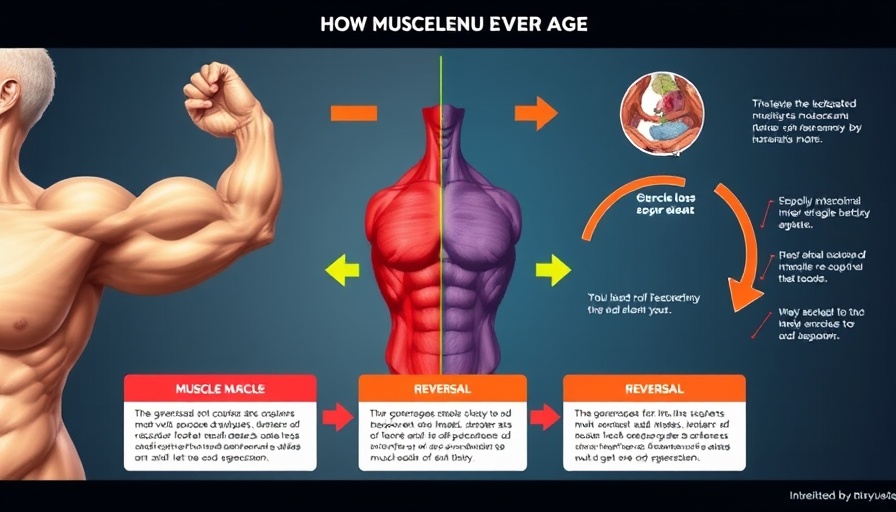
The Importance of Muscle Mass as You Age
As we journey through life, particularly after reaching 30, it becomes increasingly important to understand the factors that contribute to our well-being as we age. One alarming statistic that may surprise many is that the average individual can lose approximately 40% of their muscle mass between the ages of 30 and 80. This muscle loss is not just an aesthetic issue; it can significantly impact overall health and longevity. In fact, a study looking into the longevity of 1,700 seniors revealed that those with less muscle mass had a significantly higher mortality rate over a span of 12 years. Clearly, maintaining muscle is not just about strength—it's a critical factor in achieving a longer and healthier life.
In 'Senior Nutrition For Muscle Gain (Secret to Staying Strong After 55)', the discussion dives into key nutritional strategies for maintaining muscle mass as we age, prompting a deeper analysis on the critical role of protein in senior health.
Protein: The Key Ingredient for Muscle Maintenance
Amidst the various nutrients we consume, protein stands out as essential for muscle preservation, particularly for seniors. It’s not just about eating more; it’s about the quality and quantity of protein consumed. Studies suggest that seniors should aim for approximately 70-125 grams of protein daily, which is significantly more than the standard recommendation of roughly 46 grams for a sedentary individual. This higher intake is essential as older adults often struggle to maintain muscle protein synthesis—a process fundamental for building and preserving muscle tissue.
Understanding Protein Needs and Sources
But what does this mean in practical terms for the average older adult? The relationship between protein sources and digestibility is critical. Animal proteins such as fish, chicken, and eggs generally score higher on the digestibility scale than plant proteins like beans and lentils. This indicates that while plant proteins are valuable, seniors might need to consume larger quantities to obtain adequate essential amino acids necessary for muscle maintenance. Another key takeaway is that the whole form of food is preferable: whole foods boast higher nutrient profiles than processed options, leading to better health outcomes.
The Role of Leucine in Muscle Health
Among the many amino acids found within protein, leucine emerges as particularly beneficial for seniors. It acts as a catalyst to stimulate muscle protein synthesis. Foods rich in leucine should be prioritized in the diets of aging individuals to maximize their muscle retention efforts. Prioritizing meals that integrate sources of leucine, like dairy and meat, can enhance muscle performance and overall health.
Myths About Protein Needs
Counter to common misconceptions, it’s crucial to understand that older adults can absorb more protein than the traditionally quoted limit of 30 grams per meal. Research has consistently indicated that protein intake beyond this threshold can still contribute positively to muscle synthesis. Moreover, concerns over kidney damage from high protein diets have been debunked; no adverse effects were found in studies examining individuals on high-protein diets.
Practical Tips for Increasing Daily Protein Intake
It can be daunting to reach protein goals amidst busy lives, but making small changes can make a significant difference. Here are some practical tips:
- Start the Day Right: Integrate a protein-heavy breakfast. A meal featuring three eggs can easily provide 30 grams of protein.
- Focus on Proteins at Every Meal: Whether it’s a bison burger for lunch or a yogurt for a snack, making protein the highlight of meals is essential.
- Healthy Snacks: Opt for protein-rich snacks such as hardboiled eggs or cottage cheese to prevent unhealthy snacking.
- Meal Prep: Consider pre-cooking proteins over the weekend to ensure that healthy options are readily available during the week.
Conclusion: The Path to Vitality and Health
As you navigate life, especially beyond the age of 55, prioritizing protein intake is crucial. Moving forward, embracing a protein-forward diet coupled with regular exercise can ensure that years added to your life are not just lived but enjoyed with vigor and health. For those eager to plateau or enhance their vitality in the golden years, controlling protein intake is an act of empowerment. Start today—incorporate protein into every meal and experience the difference.
 Add Row
Add Row  Add
Add 




 Add Row
Add Row  Add
Add 


Write A Comment